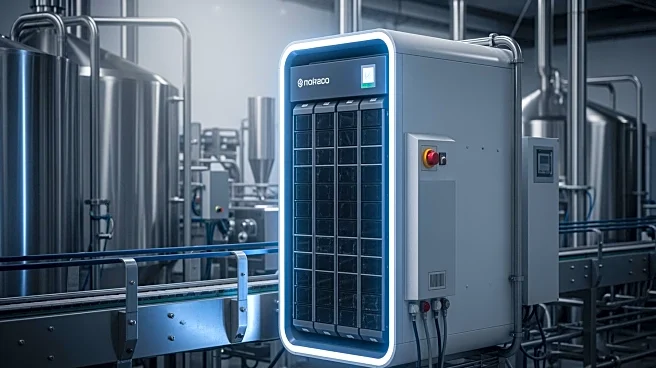What's Happening?
Rondo Energy, a US-based energy storage startup, is set to implement its Heat Battery system at a Heineken brewery in Portugal. This initiative aims to replace natural gas with renewable energy sources
to supply high heat for beer production. The Heat Battery system utilizes firebricks to store and circulate heat, absorbing electricity from solar arrays during off-peak periods. The project is supported by EU-Catalyst funds and marks the first large-scale use of brick-type thermal energy storage in the European beverage industry. Rondo's system is designed as a cost-effective replacement for conventional boilers, offering significant energy resilience and cost advantages.
Why It's Important?
The deployment of Rondo's Heat Battery system in Europe represents a significant step towards industrial decarbonization, particularly in the beverage sector. By utilizing renewable energy, the system helps stabilize energy costs and enhances energy resilience in a volatile market. This project could serve as a model for other industries, encouraging the adoption of renewable energy solutions and reducing reliance on fossil fuels. The collaboration with Heineken and EDP highlights the potential for innovative energy solutions to transform traditional industrial processes, contributing to global sustainability goals.
What's Next?
If successful, the Rondo Heat Battery system could be replicated across various sectors, promoting widespread adoption of renewable energy in industrial applications. The partnership with EDP provides a 'Heat as a Service' package, simplifying the integration of advanced technology without operational complexity. This turnkey solution could attract more companies to adopt similar systems, further driving the transition to sustainable energy practices. Additionally, Rondo's ongoing projects in the US, including potential installations at Diageo facilities, indicate continued expansion and impact in the energy storage market.
Beyond the Headlines
The use of firebricks in Rondo's Heat Battery system reflects a blend of ancient technology with modern materials science, showcasing the potential for traditional methods to contribute to contemporary energy solutions. This approach not only supports decarbonization efforts but also highlights the importance of innovation in achieving sustainability goals. The project's success could influence policy decisions and encourage further investment in renewable energy technologies, fostering a more sustainable industrial landscape.









